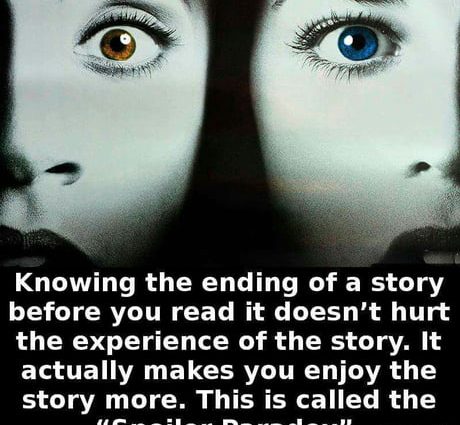«Only without spoilers!» — a phrase that can bring almost any film critic to white heat. And not only him. We are terribly afraid of knowing the denouement ahead of time — also because we are sure that in this case the pleasure of getting to know a work of art will be hopelessly spoiled. But is it really so?
In all cultures and at all times, people have told stories. And over these millennia, we have understood exactly what makes any story interesting, regardless of the format. One of the most important parts of a good story is its ending. We try to do everything so as not to find out ahead of time the denouement of a film that we have not yet seen, or a book that we have not yet read. As soon as we accidentally hear the ending in someone’s retelling, it seems that the impression is irrevocably spoiled. We call such troubles “spoilers” (from the English to spoil — “spoil”).
But they don’t deserve their bad reputation. A recent study showed that knowing the end of a story before reading it won’t hurt comprehension. Quite the contrary: it makes it possible to fully enjoy history. This is the spoiler paradox.
Researchers Nicholas Christenfeld and Jonathan Leavitt of the University of California conducted three experiments with 12 short stories by John Updike, Agatha Christie, and Anton Pavlovich Chekhov. All the stories had memorable plots, ironic twists and riddles. In two cases, the subjects were told the ending beforehand. Some were offered to read it in a separate text, others included a spoiler in the main text, and the ending became known already from the first specially prepared paragraph. The third group received the text in its original form.
This study changes the idea of spoilers as something harmful and unpleasant.
The results of the study showed that in each type of story (ironic twist, mystery, and evocative story), participants preferred the «spoiled» versions over the originals. Most of all, the subjects liked the texts with a spoiler inscribed at the beginning of the text.
This changes the idea of spoilers as something harmful and unpleasant. To understand why this is so, consider a study conducted back in 1944 by Fritz Heider and Mary-Ann Simmel of Smith College. It has not lost its relevance to this day.
They showed the participants an animation of two triangles, a circle and a square. Despite the fact that simple geometric figures moved in a chaotic manner on the screen, the subjects attributed intentions and motives to these objects, “humanizing” them. Most subjects described the circle and the blue triangle as «in love» and noted that the big bad gray triangle was trying to get in their way.
This experience demonstrates our passion for storytelling. We are social animals, and stories are an important tool to help us understand human behavior and communicate our observation to others. This has to do with what psychologists call a «theory of mind.» Grossly simplifying, it can be described as follows: we have the ability to understand and try on ourselves the thoughts, desires, motives and intentions of others, and we use this to predict and explain their actions and behavior.
We have the ability to understand other people’s intentions and predict what behavior they will cause. Stories are important because they allow us to communicate these causal relationships. So, a story is good if it fulfills its function: it conveys information to others. This is why a «corrupted» story, the end of which is known in advance, is more attractive: it is easier for us to understand it. The authors of the study describe this effect as follows: “ignorance of the ending can spoil the pleasure, diverting attention from details and aesthetic qualities.”
You have probably witnessed more than once how a good story can be repeated and be in demand, despite the fact that the denouement has long been known to everyone. Think of stories that have stood the test of time, like the myth of Oedipus. Despite the fact that the ending is known (the hero will kill his father and marry his mother), this does not reduce the listener’s involvement in the story.
With the help of history, you can convey the sequence of events, understand other people’s intentions.
“Maybe it’s more convenient for us to process information and it’s easier to focus on a deeper understanding of history,” suggests Jonathan Leavitt. This is important because we use stories to convey complex ideas, from religious beliefs to societal values.
Take the story of Job from the Old Testament. The Israelites passed on this parable to explain to posterity why a good, godly person can suffer and be unhappy. We convey complex ideologies through stories because they can be processed and stored more easily than formal text.
Research has shown that we respond more positively to information when it is presented in narrative form. Information conveyed as «fact» is subjected to critical analysis. Stories are an effective way to convey complex knowledge. Think about it: words can help you understand a single term or concept, but a story can convey a whole sequence of events, understand other people’s intentions, ethical rules, beliefs, and social conventions.
Spoiler — it’s not always bad. It simplifies a complex story, making it easier to comprehend. Thanks to him, we are more involved in history and understand it on a deeper level. And perhaps, if this «corrupted» story is good enough, it could live on for thousands of years.
Author — Adori Duryappa, psychologist, writer.










